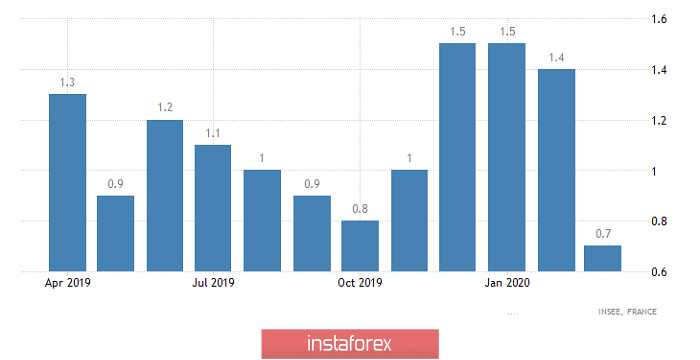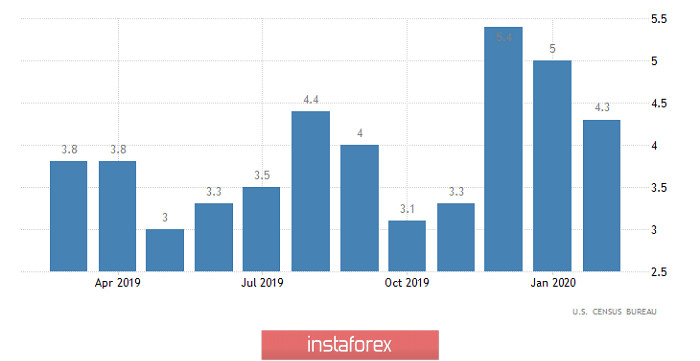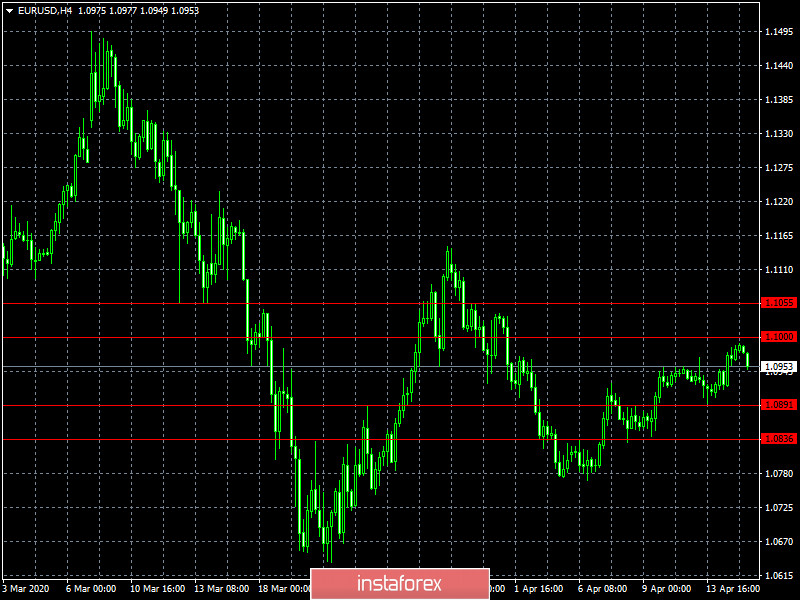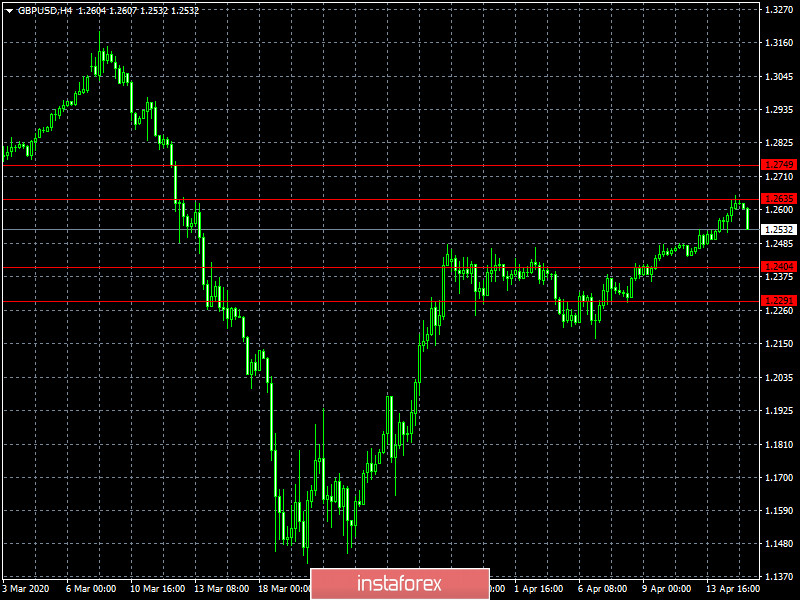The market was almost dead for several days due to long weekends in the United States and Europe. This allowed it to calm down a bit and take a breath. But the calmness in the market also dragged on due to the fundamental lack of macroeconomic data. After all, it was a full-time working day yesterday, no matter how ridiculous it may sound, in the conditions of actual quarantine on both sides of the Atlantic. However, no statistics were published. So the market was forced to switch to the accompanying information background. And there's only one of them right now, and that's the coronavirus situation. And surprisingly, the market reacted exactly to what was happening in connection with the coronavirus epidemic. For the single European currency, everything immediately began in a bad way, because, despite the clearly positive dynamics of a daily decrease in the number of new cases of coronavirus infection, Macron decided to extend the limited quarantine regime until May 11. And that people sit at home every day, the economy is only digging deeper into a recession, from which it is not yet clear how to get out. Moreover, the extension of this regime will inevitably lead only to even more terrible consequences. And it is clear that the decision of the President of France was perceived solely as a negative signal. Yet everyone perfectly understands that if France, the second country of the eurozone, has taken such a step, then others will follow its example. Moreover, in countries such as Italy, Spain, and even Germany, the pandemic is worse than in France. At the same time, this is in sharp contrast to Trump's increasingly vocal statements about the need to end the restrictive measures as soon as possible. According to the President of the United States, the situation is already beginning to stabilize and it is time to think about how to release people from home confinement. Trump does not even hide that his goal is to restart the economy as quickly as possible, so that it starts working at full strength and quickly gets out of the recession, preferably before the election. However, it was coronavirus that ultimately became the cause of the weakening of the dollar, which began shortly before the opening of the American session. Despite Trump's boldness, the number of new cases of coronavirus infection has begun to increase again in the United States. And in an instant, it became clear to everyone that Trump's words would remain words. It is too early to talk about ending restrictive measures. Of course, the economy is sliding into a deep abyss, but if quarantine measures are canceled, the number of infections will grow even faster. And with them the number of deaths. And with them, the number of fatalities. And as much as Trump would like, the sick, and even more so the dead, can not work for the benefit of the economy too much. And fortunately for the pound, the sad statistics of the spread of the coronavirus epidemic in the United States saved it from falling. London has said that it is extending the restrictive measures after France. However, not until may 11, but only until may 7. And of course, it was not without theatrics from the same Trump, who said that the World Health Organization does not perform its functions well and generally failed the coronavirus epidemic, so the United States is suspending its funding. However, this is rather just a certain filling of the picture with colors.

Today should be a little easier. At least there will be no shortage of macroeconomic statistics, which have already begun to be published. For example, inflation fell from 1.4% to 0.7% in France, which is slightly better than the preliminary estimate, which showed a decrease to 0.6%. However, this is still a decrease, and quite significant. But if the data in France came out slightly better than predicted, then in Spain, the opposite. Inflation was supposed to decline from 0.7% to 0.1%, but in fact it did not. That is, the change in consumer prices on an annualized basis is equal to 0.0%. This is almost deflation. And we are talking about the fourth economy of the euro area. Italy will also report on inflation, where it should fall from 0.3% to 0.1%. And something tells us that in the best case, the situation will be like in Spain. So it is not surprising that the single European currency is already slowly moving down.
Inflation (France):

Apparently, we will see a repeat of yesterday's scenario in the afternoon, and the dollar will become cheaper. This will be connected precisely with Trump's fears, pushing him to think about the need for an early termination of restrictive measures, so that people can finally return to work. The fact is that retail sales growth of 4.3% should be replaced by a decline of -2.0%. This is an incredibly rapid drop in retail sales. But consumer activity is the cornerstone of the American economy. The labor market is already filled with unemployed people, which is likely to only increase, which means that consumer activity will continue to go down. And given the extremely high share of the service sector in the structure of the American economy, this in itself will provoke a further increase in unemployment. Many companies simply begin to go bankrupt, and not just mourn over the reduction in profits. In other words, the picture is really terrifying, and to some extent Trump can be understood. In any case, it was the success in the economy that was his main argument in the run-up to the upcoming presidential elections. And now all of this is collapsing overnight, with an eviction from the White House fading on the horizon. In addition, industrial production, which only in February stopped declining, showing at least zero growth, may well resume its decline. In annual terms, the rate of decline may be -1.5%. And in all this beauty, do not forget about the incredible increase in unemployment. People have less money in their hands, which means they will spend less. Therefore, the decline will only get worse.
Retail Sales (United States):

Weak inflation data has already led to a slight decrease in the single European currency. However, US statistics will lead to its return to the area of 1.1000.

The pound is actively declining. Apparently, winning back yesterday's decision to extend the restrictive measures until May 7. Of course, the single European currency itself has a negative effect, which pulls the pound slightly. Rumors are also actively circulating that due to the coronavirus, negotiations on a trade deal between the European Union and the United Kingdom could be postponed to next year. All this negatively affects the pound. However, US statistics may return the pound to 1.2625.






















